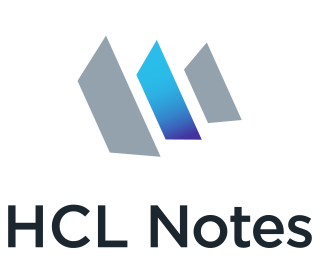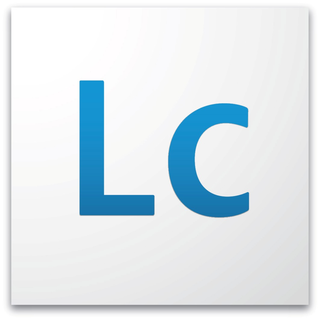
HCL Notes is a proprietary collaborative software platform for Unix, Windows, Linux and macOS, sold by HCLTech. The client application is called Notes while the server component is branded HCL Domino.
Interactive voice response (IVR) is a technology that allows telephone users to interact with a computer-operated telephone system through the use of voice and DTMF tones input with a keypad. In telephony, IVR allows customers to interact with a company's host system via a telephone keypad or by speech recognition, after which services can be inquired about through the IVR dialogue. IVR systems can respond with pre-recorded or dynamically generated audio to further direct users on how to proceed. IVR systems deployed in the network are sized to handle large call volumes and also used for outbound calling as IVR systems are more intelligent than many predictive dialer systems.
VoiceXML (VXML) is a digital document standard for specifying interactive media and voice dialogs between humans and computers. It is used for developing audio and voice response applications, such as banking systems and automated customer service portals. VoiceXML applications are developed and deployed in a manner analogous to how a web browser interprets and visually renders the Hypertext Markup Language (HTML) it receives from a web server. VoiceXML documents are interpreted by a voice browser and in common deployment architectures, users interact with voice browsers via the public switched telephone network (PSTN).
Call Control eXtensible Markup Language (CCXML) is an XML standard designed to provide asynchronous event-based telephony support to VoiceXML. Its current status is a W3C recommendation, adopted May 10, 2011. Whereas VoiceXML is designed to provide a Voice User Interface to a voice browser, CCXML is designed to inform the voice browser how to handle the telephony control of the voice channel. The two XML applications are wholly separate and are not required by each other to be implemented - however, they have been designed with interoperability in mind
Jargon Software Inc. is a computer software development company that specializes in development and deployment tools and business applications for mobile handheld devices such as Pocket PC and Symbol PDA devices.
Speech Application Language Tags (SALT) is an XML-based markup language that is used in HTML and XHTML pages to add voice recognition capabilities to web-based applications.

Uniface is a low-code development and deployment platform for enterprise applications that can run in a large range of runtime environments, including mobile, mainframe, web, Service-oriented architecture (SOA), Windows, Java EE, and .NET. Uniface is used to create mission-critical applications.
Altova is a commercial software development company with headquarters in Beverly, MA, United States and Vienna, Austria, that produces integrated XML, JSON, database, UML, and data management software development tools.
A service delivery platform (SDP) is a set of components that provides a service(s) delivery architecture for a type of service delivered to consumer, whether it be a customer or other system. Although it is commonly used in the context of telecommunications, it can apply to any system that provides a service. Although the TM Forum (TMF) is working on defining specifications in this area, there is no standard definition of SDP in industry and different players define its components, breadth, and depth in slightly different ways.
The Speech Application Programming Interface or SAPI is an API developed by Microsoft to allow the use of speech recognition and speech synthesis within Windows applications. To date, a number of versions of the API have been released, which have shipped either as part of a Speech SDK or as part of the Windows OS itself. Applications that use SAPI include Microsoft Office, Microsoft Agent and Microsoft Speech Server.

Adobe LiveCycle Enterprise Suite (ES4) is a service-oriented architecture Java EE server software product from Adobe Systems used to build applications that automate a broad range of business processes for enterprises and government agencies. LiveCycle ES4 is an enterprise document and form platform that allows capturing and processing information, delivering personalized communications, and protecting and tracking sensitive information. It is used for purposes such as account opening, services, and benefits enrollment, correspondence management, requests for proposal processes, and other manual-based workflows. LiveCycle ES4 incorporates new features with a particular focus on mobile devices. LiveCycle applications also function in both online and offline environments. These capabilities are enabled through the use of Adobe Reader, HTML/PhoneGap, and Flash Player clients to reach desktop computers and mobile devices.
Mobile local search is a technology that lets people search for local things using mobile equipment such as mobile phones, PDAs, and other mobile devices. Mobile local search satisfies the need to offer a mobile subscriber spontaneous access to near-position services and information such as businesses, products, events, restaurant, movie theatre or other local information. Mobile local search is the search and discovery of persons, places, and things within an identifiable space defined by distinct parameters. These parameters are evolving. Today they include social networks, individuals, cities, neighborhoods, landmarks, and actions that are relevant to the searcher's past, current, and future location. These parameters provide structure to vertically deep and horizontally broad data categories that can stand-alone or are combined to comprise searchable directories.
Perst is an open source, dual license, object-oriented embedded database management system (ODBMS). Both the Java programming language, and the C# programming language versions are compact and Perst has been implemented on smart phones running the Android and Windows Phone (WP7) operating systems.
XHTML+Voice is an XML language for describing multimodal user interfaces. The two essential modalities are visual and auditory. Visual interaction is defined like most current web pages via XHTML. Auditory components are defined by a subset of Voice XML. Interfacing the voice and visual components of X+V documents is accomplished through a combination of ECMAScript, JavaScript, and XML Events.
TigerLogic Corporation was an American internet and software development company that designed, developed, sold and supported software infrastructure products. This software was categorized into the following product lines: Yolink search enhancement technology, XML Data Management Server (XDMS), Multidimensional Data Management System (MDMS) and Rapid Application Development (RAD) software tools. TigerLogic was dissolved in 2016, with its MultiValue database products sold to Rocket Software, and its Omnis products sold to UK-based OLS Holdings Ltd.
Voxeo Corporation was a technology company that specialized in providing development platforms for unified customer experience (self-service) and unified communications applications. Voxeo was headquartered in Orlando, Florida with main offices in Cologne, Germany; Beijing, China; London, UK and San Francisco, US.
Alvaria, Inc., formerly Aspect Software, Inc., is an American multinational software company that sells call center and customer experience (CX) software technology to large enterprises. The company is headquartered in Westford, Massachusetts. In 2021, Aspect purchased Noble Systems Corporation; the resultant organization was officially announced in September 2021 as Alvaria, Inc.


